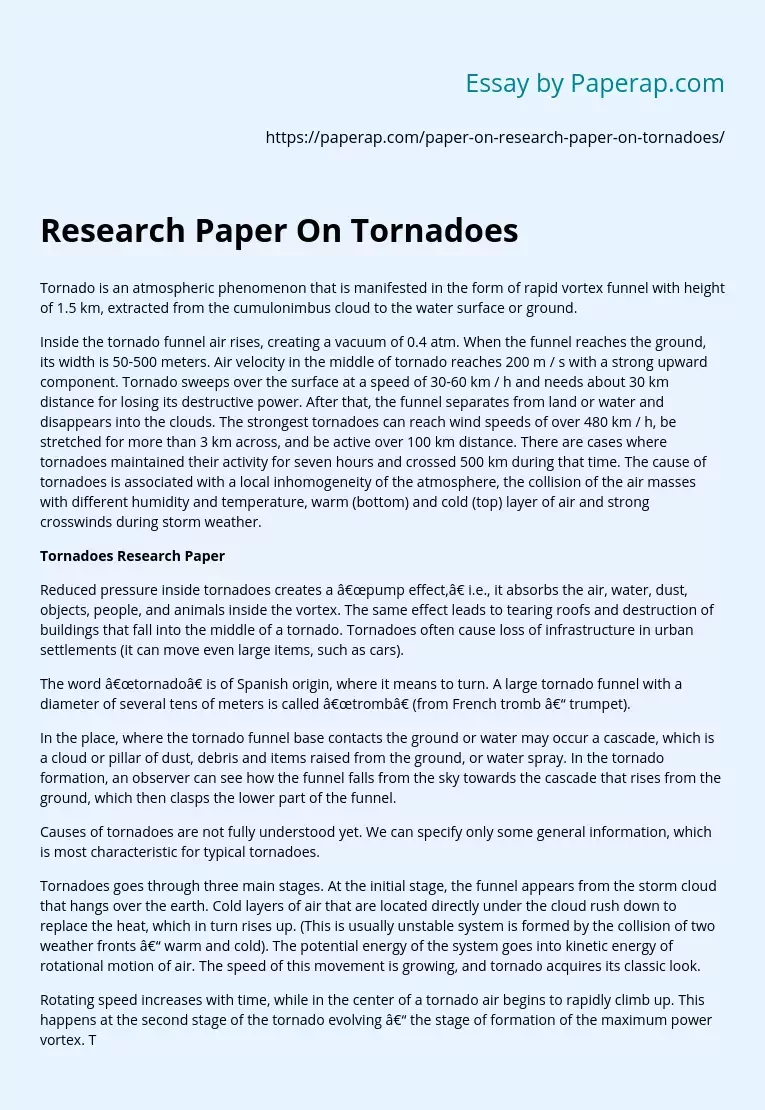Research Paper On Tornadoes
Tornado is an atmospheric phenomenon that is manifested in the form of rapid vortex funnel with height of 1.5 km, extracted from the cumulonimbus cloud to the water surface or ground.
Inside the tornado funnel air rises, creating a vacuum of 0.4 atm. When the funnel reaches the ground, its width is 50-500 meters. Air velocity in the middle of tornado reaches 200 m / s with a strong upward component. Tornado sweeps over the surface at a speed of 30-60 km / h and needs about 30 km distance for losing its destructive power.
After that, the funnel separates from land or water and disappears into the clouds. The strongest tornadoes can reach wind speeds of over 480 km / h, be stretched for more than 3 km across, and be active over 100 km distance. There are cases where tornadoes maintained their activity for seven hours and crossed 500 km during that time. The cause of tornadoes is associated with a local inhomogeneity of the atmosphere, the collision of the air masses with different humidity and temperature, warm (bottom) and cold (top) layer of air and strong crosswinds during storm weather.
Tornadoes Research Paper
Reduced pressure inside tornadoes creates a “pump effect,” i.e., it absorbs the air, water, dust, objects, people, and animals inside the vortex. The same effect leads to tearing roofs and destruction of buildings that fall into the middle of a tornado. Tornadoes often cause loss of infrastructure in urban settlements (it can move even large items, such as cars).
The word “tornado” is of Spanish origin, where it means to turn.
A large tornado funnel with a diameter of several tens of meters is called “tromb” (from French tromb – trumpet).
In the place, where the tornado funnel base contacts the ground or water may occur a cascade, which is a cloud or pillar of dust, debris and items raised from the ground, or water spray. In the tornado formation, an observer can see how the funnel falls from the sky towards the cascade that rises from the ground, which then clasps the lower part of the funnel.
Causes of tornadoes are not fully understood yet. We can specify only some general information, which is most characteristic for typical tornadoes.
Tornadoes goes through three main stages. At the initial stage, the funnel appears from the storm cloud that hangs over the earth. Cold layers of air that are located directly under the cloud rush down to replace the heat, which in turn rises up. (This is usually unstable system is formed by the collision of two weather fronts – warm and cold). The potential energy of the system goes into kinetic energy of rotational motion of air. The speed of this movement is growing, and tornado acquires its classic look.
Rotating speed increases with time, while in the center of a tornado air begins to rapidly climb up. This happens at the second stage of the tornado evolving – the stage of formation of the maximum power vortex. Tornado is fully formed and moving in different directions.
The final phase is the destruction of the vortex. The tornado power weakens, funnel narrows, and goes up off from the ground, gradually rising back into the parent cloud.
The lifetime of each stage varies and ranges from several minutes to several hours (in exceptional cases). The speed ?of tornadoes promotion also varies, on average – 40 – 60 km / h (in very rare cases it can reach 210 km / h).
Use free sample research paper topics to write a good research proposal on different Tornadoes topics.
At EssayLib.com writing service you can order a custom research paper on Tornado topics. Your research paper will be written from scratch. We hire top-rated Ph.D. and Master’s writers only to provide students with professional research paper or essay writing assistance at affordable rates. Each customer will get a non-plagiarized paper with timely delivery. Just visit our website and fill in the order form with all research paper details:
Enjoy our professional research paper writing service!
Research Paper On Tornadoes. (2019, Dec 05). Retrieved from https://paperap.com/paper-on-research-paper-on-tornadoes/

